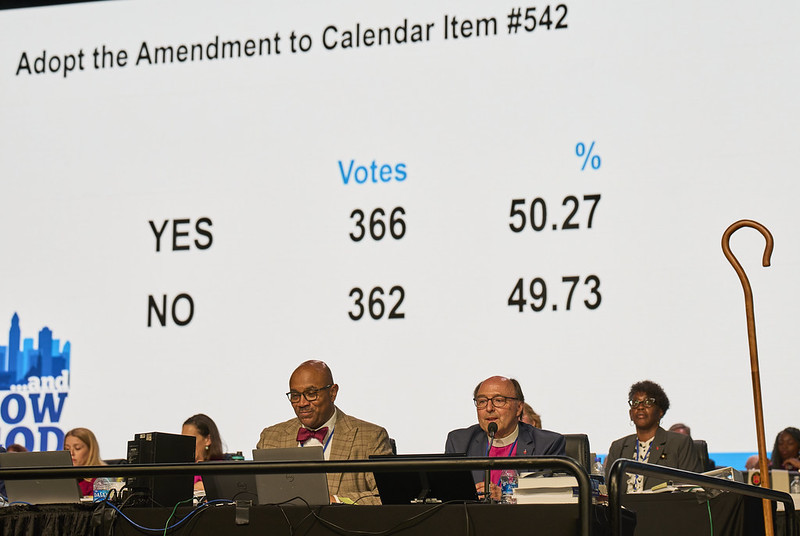
General Conference reduces requested giving

Bishop David Alan Bard of the Michigan Episcopal Area views the result of a close vote during April 30 debate at the 2024 United Methodist General Conference in Charlotte, North Carolina. Photo by Paul Jeffrey,UM News.
Delegates voted to reduce a key component of calculating apportionments — the portion of church giving requested to fund the general-church budget.
During an afternoon session on April 30, delegates passed the new base rate for The United Methodist Church’s apportionment formula in the most contested plenary vote so far at this year’s General Conference.
As a result, conferences will shift from their current base rate of 3.29% to a base rate of 2.6% for 2025 and 2026. Then, if the apportionment collection rate is 90% or higher in those years, the base rate will jump to 2.9% for 2027 and 2028.
The reduced rate may help the Dakotas Conference meet the apportioned request. In the past four years, the conference met the giving request from the general at 100 percent in 2021 and 2022. In 2020, 68.1% and in 2023, 52.3% were the percentages of funds apportioned by the general church paid by the Dakotas.
The United Methodist Church has several levels that reflect the broader polity levels of the church: In the US, there are apportionments paid that go to support the work of the annual conference, the jurisdiction, and the general church.
The percentage of apported giving at the conference level in the Dakotas has fluctuated. In 2019, apportioned giving was 71.75 percent. Information about giving for 2020 is not available. The percentage of giving at the conference level was 64.85 %, for 2021 and 64.855% in 2022. Apportioned gifts to the conference for 2023 are estimated at 86.52%.
“The 2023 statistics are not finalized. There are a few churches that are finalizing some things,” said Jim Ducker, executive director of Finance and Administration for the Dakotas Conference.
Together, through connected congregations, The United Methodist Church can accomplish what no single church, district or annual conference ever could hope to do alone. In this way, each individual, each family, each congregation gives a fair share for the church's work.
“That is the power of the connection. We can reach out across the world to make an impact and a difference,” said Kara Heagel, lay delegate for the Dakotas Conference.